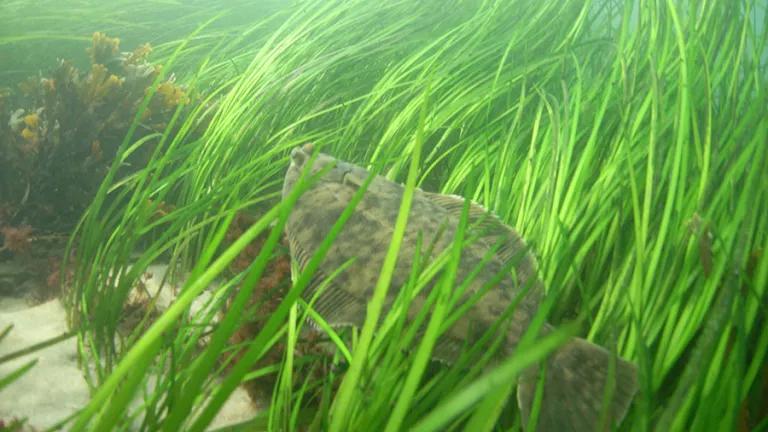Healthier, Climate-Ready Fisheries on the Menu for Congress

The Magnuson-Stevens Act (MSA), our federal fisheries law, has not been reauthorized since 2006. And with a robust new draft bill to amend it, House lawmakers are breathing new life into the conversation about managing our nation’s fisheries.
Representative Jared Huffman (D-CA-2), Chairman of the House Natural Resources Subcommittee on Water, Oceans, and Wildlife, and fellow subcommittee member Representative Ed Case (D-HI-1), released the draft bill in December to reauthorize and update the MSA. It seeks to address the changing needs of sustainable fisheries and coastal communities, including tackling new challenges—like climate change and its drastic impacts on marine ecosystems.
The draft bill follows a year-long “listening tour,” championed by Subcommittee Chairman Huffman. Joined by other members of Congress, he met with a diverse group of stakeholders from coast to coast and in the Western Pacific to discuss the successes and shortcomings of fisheries management policies. In total, these sessions featured 80 distinguished panelists, including commercial fishermen, recreational anglers and fishing guides, tribal members, scientists, conservationists, seafood businesses, chefs, and local officials and fishery managers, as well as other interested stakeholders who provided public comment.
As an organization committed to ensuring healthy fisheries and marine ecosystems, we are deeply thankful to Rep. Huffman and his staff for their dedication to this thoughtful and inclusive process.
For over 40 years, the MSA’s unique system of stakeholder-driven, science-based fishery management has shown us that putting long-term fisheries sustainability first can work. (More on that here.) As fisheries stewards, our job today is far from complete, however. Plenty of fish stocks still face overfishing; nearly all face habitat degradation and the growing impacts of climate change and ocean acidification; many ecologically important species have been left poorly managed or unmanaged by any federal plan; and fisheries data systems require updating to ensure effective management and accountability.
Seeking to build on the MSA’s successes and address these and other challenges, the MSA discussion draft released by Reps. Huffman and Case has several notable highlights. It would:
- Advance climate-ready fisheries management: As our oceans warm rapidly, fish populations off our coasts are moving into cooler waters, dwindling in productivity, and facing more frequent extreme events such as marine heat waves. (You can read more on this from NRDC’s Lisa Suatoni here.) There is an urgent need for policy guidance on these issues. Title I of the draft bill would respond by integrating climate considerations throughout the fisheries management process, addressing the management framework for shifting fish stocks, and jumpstarting the production and use of climate-related science and data.
- Strengthen protections for important fish habitats: Title V would strengthen tools to protect essential fish habitat from the impacts of fishing gear, as well as safeguard habitat from non-fishing activities such as sand mining, dredging, and energy exploration. Protecting the diverse marine habitats that support fish populations is an important but underutilized element of sustainable fisheries management under the MSA. It is also a key strategy for readying marine ecosystems for the effects of climate change.
- End chronic overfishing and rebuild depleted fish populations: While fishery managers and fishing communities have made significant progress in this regard, key gaps remain that have prevented managers from ensuring that all stocks recover and are maintained at healthy levels. Title V would help to ensure that rebuilding plans stay on track, and put an end to chronic overfishing.
- Improve protections for other key marine species: Title V would also introduce important reforms to improve the precautionary management of forage fish, a critical food source for larger fish species and ocean wildlife, and to reduce bycatch—the unintended catch of non-target fish, marine mammals, and other wildlife.
- Support coastal communities: Fishing communities, powerhouses of our coastal economies, are also on the frontlines of the climate crisis and global economic disruptions wrought by the pandemic. Title II of the bill would support sustainable fishing communities through a number of reforms, including a grants program for working waterfronts and updates to the fisheries disaster relief program.

Other highlights of the draft include measures to modernize fisheries data collection and research (Title IV) and to increase accountability and transparency in the fishery management council process (Title III).
In reviewing the draft, we also found a couple points of concern. One is a proposal to remove the key term “overfished” throughout the MSA, replacing it instead with the term “depleted” in recognition of environmental and other factors that play a role in the productivity of a fishery. Another would remove a current requirement that rebuilding plans for overfished stocks shall not exceed 10 years (where biologically possible to rebuild in that timeline). In our view, these changes would undermine the statute’s successful requirements to rebuild overfished fisheries and prevent overfishing, and make it harder for fishery managers who must vote for necessary reductions in catch to do their job to ensure healthy fisheries.
Through previous reauthorizations of the MSA in 1996 and 2006, Congress has consistently made progress on sustainable fisheries management, with broad bipartisan support. Rep. Huffman’s listening tour offered an important opportunity to deliberate about these issues, and the discussion draft has laid the groundwork for a bill that could build on past gains and respond to new challenges in our rapidly changing oceans.
We thank Representatives Huffman and Case again for their commitment to sustainable fisheries, and we look forward to working with them and other lawmakers in the 117th Congress. We will be submitting comments on the draft bill and providing updates as this bill progresses. Be sure to stay tuned.

